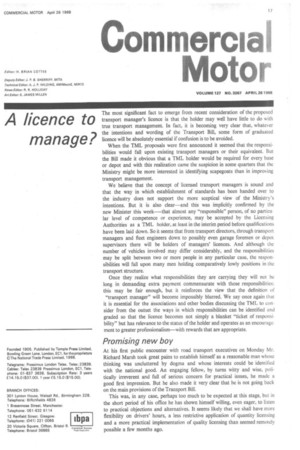A licence to manage?
Page 19

If you've noticed an error in this article please click here to report it so we can fix it.
The most significant fact to emerge from recent consideration of the proposed transport manager's licence is that the holder may well have little to do with true transport management. In fact, it is becoming very clear that, whatever the intentions and wording of the Transport Bill, some form of graduated licence will be absolutely essential if confusion is to be avoided.
When the TML proposals were first announced it seemed that the responsibilities would fall upon existing transport managers or their equivalent. But the Bill made it obvious that a TML holder would be required for every base or depot and with this realization came the suspicion in some quarters that the Ministry might be more interested in identifying scapegoats than in improving transport management.
We believe that the concept of licensed transport managers is sound and that the way in which establishment of standards has been handed over to the industry does not support the more sceptical view of the Ministry's intentions. But it is also clear—and this was implicitly confirmed by the new Minister this week—that almost any "responsible" person, of no partieu lar level of competence or experience, may be accepted by the Licensing Authorities as a TML holder, at least in the interim period before qualifications have been laid down. So it seems that from transport directors, through transport managers and fleet engineers down to possibly even garage foremen or depot supervisors there will be holders of managers' licences. And although the number of vehicles involved may differ considerably, and the responsibilities may be split between two or more people in any particular case, the responsibilities will fall upon many men holding comparatively lowly positions in the transport structure.
Once they realize what responsibilities they are carrying they will not he long in demanding extra payment commensurate with those responsibilities: this may be fair enough, but it reinforces the view that the definition of "transport manager" will become impossibly blurred. We say once again that it is essential for the associations and other bodies discussing the TML to consider from the outset the ways in which responsibilities can be identified and graded so that the licence becomes not simply a blanket "ticket of responsibility" but has relevance to the status of the holder and operates as an encouragement to greater professionalism—with rewards that are appropriate.
Promising new boy
At his first public encounter with road transport executives on Monday Mr. Richard Marsh took great pains to establish himself as a reasonable man whose thinking was uncluttered by dogma and whose interests could be identified with the national good. An engaging fellow, by turns witty and wise, politically irreverent and full of serious concern for practical issues, he made a good first impression. But he also made it very clear that he is not going back on the main provisions of the Transport Bill.
This was, in any case, perhaps too much to be expected at this stage, but in the short period of his office he has shown himself willing, even eager, to listen to practical objections and alternatives. It seems likely that we shall have more flexibility on drivers' hours, a less restrictive application of quantity licensing and a more practical implementation of quality licensing than seemed remotely possible a few months ago.




















































































































